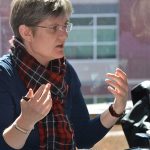The Brainwaves Video Anthology (Neag School’s Ron Beghetto is interviewed on creativity)
The Paradoxical Nature of Creativity
October 25, 2016
Read stories related to faculty experts at UConn’s Neag School of Education.
October 25, 2016
The Brainwaves Video Anthology (Neag School’s Ron Beghetto is interviewed on creativity)
October 25, 2016
le Monde (Neag School’s Joseph Cooper is quoted in this story)
October 19, 2016
This semester, UConn has become one of the pioneering U.S. universities to spearhead a national research initiative focused on issues of women and girls of color in the United States. With funding from The Collaborative, faculty, postdoctoral fellows, and graduate students in the College of Liberal Arts and Sciences, the Neag School of Education, the College of Agriculture, Health, and Natural Resources, and the School of Social Work are working on two topics related to women and girls of color: environment and public health issues, and STEM pipeline issues.
October 18, 2016
The Daily Campus (Neag School’s Richard Gonzales was interviewed about the Wallace Foundation initiative)
October 17, 2016
WNPR (Neag School’s Richard Gonzales was interviewed about the Wallace Foundation grant given to the Neag School to strengthen its principal preparation program)

October 14, 2016
Congratulations to our Neag School alumni, faculty, staff, and students on their continued accomplishments inside and outside the classroom.
October 13, 2016
EdWeek (The Neag School was mentioned in article about the Wallace Foundation grant)
October 13, 2016
The Wallace Foundation (The Neag School to participate with initiative to improve how aspiring principals are trained, and then share the results)
October 13, 2016
Business Insider (Neag School’s Preston Green is interviewed in this article relating charter schools to the subprime-mortgage crisis)

October 13, 2016
The Wallace Foundation has selected the University of Connecticut to participate in a national $47 million initiative to develop models over the next four years for improving university principal preparation programs and to examine state policy to see if it could be strengthened to encourage higher-quality training statewide. An independent study will capture lessons from the participating universities and their partners, to be shared with policymakers and practitioners across the country.